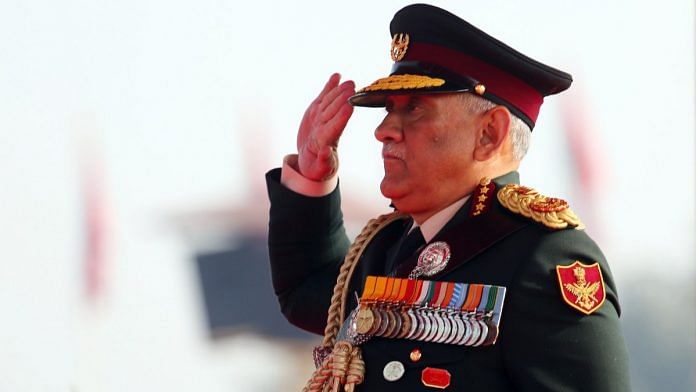New Delhi: The newly-created Department of Military Affairs (DMA) headed by General Bipin Rawat, who is also the first Chief of Defence Staff (CDS), will give preference to domain experts just like in organisations such as the Ministry of External Affairs (MEA), Defence Research and Development Organisation (DRDO) and Indian Space Research Organisation (ISRO), a top officer said Friday.
“We are taking lessons from DRDO and ISRO where there are specialists, and based on that the final structure of DMA will be firmed up,” Major General Mukesh Aggarwal, defence advisor to CDS, said.
It will be a mix of civil and military personnel and will have a lean structure, the officer said.
While the MEA is headed and has a majority of Indian Foreign Service (IFS) officers, the DRDO has scientists and technocrats and ISRO has scientists at all decision-making levels.
Also read: Rawat push not enough. Military & bureaucracy must set aside rivalry for defence university
The DMA structure
The DMA is currently operating with an interim structure as the government is yet to accord a final sanction on the structure of the department, which falls under the Ministry of Defence.
As a result, only Rawat, who is both the secretary of the DMA and the CDS, has financial powers in the entire department.
The present structure of the DMA has the secretary at the helm. Under him, there is a secretary (transformation and coordination), a position currently held by Vice Admiral R. Hari Kumar, who is also the current Chief of Integrated Defence Staff (CISC).
There will be an additional secretary who will be a military personnel and five joint secretaries.
Of the five joint secretaries, three will be military personnel from the Army, Navy and Indian Air Force. The remaining two joint secretaries have been appointed and are from the Indian Administrative Services (IAS) — Rajeev Singh Thakur, a 1995-batch of the Rajasthan cadre and Shantanu, a 1997-batch officer of Tripura cadre.
The Army joint secretary will be responsible for the Army and the Territorial Army, the Navy joint secretary will be responsible for Defence Staff and IAF joint secretary will be responsible for staff duty.
The other two joint secretaries will be responsible for works, coordination and legal and vigilance and establishment, respectively.
The Army will also have 10 directors/deputy secretaries under it, while the Navy and the IAF will have five-six directors/deputy secretaries under it. There will also be two independent directors, including director (statutory complaints and complaints) and director (personnel). The independent directors will report to the additional secretary.
“The structure has been made in sync with how the government works,” Aggarwal said.
Also read: Growing defence pensions a problem. But CDS Rawat’s retirement age proposal not the solution
The DMA secretariat
The DMA secretariat will have the CDS, a Defence Advisor with three deputies and two aides-de-camp (ADC) among other staff.
The DMA will review for the selection board on matters of promotions of Brigadiers to Major Generals and equivalents. Earlier, it used to go to the Department of Defence (DoD) for review. But now all armed forces have been moved under DMA. Similarly, all statutory complaints, promotions and postings of senior armed forces officers will go to the DMA.
The DMA will also be in charge of revenue procurement and will have a say in the prioritisation of capital procurement. Cases prioritised by the CDS will go to the Defence Acquisition Council (DAC).
The DMA will also oversee supply of arms and ammunition to friendly neighbouring countries such as Sri Lanka, Nepal and the Maldives and monitor developments in the Indian Ocean region, Afghanistan, West Asia and SouthEast Asia.
The DMA will be responsible for key matters relating to India’s neighbouring countries including border disputes and incidents, development of infrastructure in forward areas and deployment of forces.
The DMA is the fifth vertical in the defence ministry, the other four being the departments of defence, defence production, defence research and development and ex-service welfare.
Also read: CDS wants appointment of military officers as joint secretary in defence ministry



